Handbook of the History of Logic
Volume 3
The Rise of Modern Logic: From Leibniz to Frege
Edited by
Dov M. Gabbay
Department of Computer Science, Kings College London, Strand, London, WC2R 2LS, UK
and
John Woods
Philosophy Department, University of British Columbia, Vancouver, BC Canada, V6T 1Z1
and
Department of Computer Science, Kings College London, Strand, London, WC2R 2LS, UK

Amsterdam-Boston-Heidelberg-London-New York-Oxford-Paris San Diego-San Francisco-Singapore-Sydney-Tokyo
Copyright page
ELSEVIER B.V.
Sara Burgerhartstraat 25
P.O. Box 211, 1000 AE Amsterdam
The Netherlands
ELSEVIER Inc.
525 B Street, Suite 1900
San Diego, CA 92101-4495
USA
ELSEVIER Ltd
The Boulevard, Langford Lane
Kidlington, Oxford OX5 1GB
UK
ELSEVIER Ltd
84 Theobalds Road
London WC1X8RR
UK
2004 Elsevier B.V. All rights reserved.
This work is protected under copyright by Elsevier B.V., and the following terms and conditions apply to its use:
Photocopying
Single photocopies of single chapters may be made for personal use as allowed by national copyright laws. Permission of the Publisher and payment of a fee is required for all other photocopying, including multiple or systematic copying, copying for advertising or promotional purposes, resale, and all forms of document delivery. Special rates are available for educational institutions that wish to make photocopies for non-profit educational classroom use.
).
In the USA, users may clear permissions and make payments through the Copyright Clearance Center, Inc., 222 Rosewood Drive, Danvers, MA 01923, USA; phone: (+1) (978) 7508400, fax: (+1) (978) 7504744, and in the UK through the Copyright Licensing Agency Rapid Clearance Service (CLARCS), 90 Tottenham Court Road, London W1P OLP, UK; phone: (+44) 20 7631 5555; fax: (+44) 20 7631 5500. Other countries may have a local reprographic rights agency for payments.
Derivative Works
Tables of contents may be reproduced for internal circulation, but permission of the Publisher is required for external resale or distribution of such material. Permission of the Publisher is required for all other derivative works, including compilations and translations.
Electronic Storage or Usage
Permission of the Publisher is required to store or use electronically any material contained in this work, including any chapter or part of a chapter.
Except as outlined above, no part of this work may be reproduced, stored in a retrieval system or transmitted in any form or by any means, electronic, mechanical, photocopying, recording or otherwise, without prior written permission of the Publisher. Address permissions requests to: Elsevers Rights Department, at the fax and e-mail addresses noted above.
Notice
No responsibility is assumed by the Publisher for any injury and/or damage to persons or property as a matter of products liability, negligence or otherwise, or from any use or operation of any methods, products, instructions or ideas contained in the material herein. Because of rapid advances in the medical sciences, in particular, independent verification of diagnoses and drug dosages should be made.
First edition 2004
Library of Congress Cataloging in Publication Data
A catalog record is available from the Library of Congress.
British Library Cataloguing in Publication Data
A catalogue record is available from the British Library.
ISBN: 0 444 51611 5
 The paper used in this publication meets the requirements of ANSI/NISO Z39.48-1992 (Permanence of Paper).
The paper used in this publication meets the requirements of ANSI/NISO Z39.48-1992 (Permanence of Paper).
Printed in The Netherlands.
Preface
Dov M. Gabbay, Kings College London
John Woods, University of British Columbia and Kings College London
With the publication of the present volume, the Handbook of the History of Logic turns its attention to the rise of modern logic. The period covered is 16851900, with this volume carving out the territory from Leibniz to Frege. What is striking about this period is the earliness and persistence of what could be called the mathematical turn in logic. Virtually every working logician is aware that, after a centuries-long run, the logic that originated in antiquity came to be displaced by a new approach with a dominantly mathematical character. It is, however, a substantial error to suppose that the mathematization of logic was, in all essentials, Freges accomplishment or, if not his alone, a development ensuing from the second half of the nineteenth century. The mathematical turn in logic, although given considerable torque by events of the nineteenth century, can with assurance be dated from the final quarter of the seventeenth century in the impressively prescient work of Leibniz. It is true that, in the three hundred year run-up to the Begriffsschrift, one does not see a smoothly continuous evolution of the mathematical turn, but the idea that logic is mathematics, albeit perhaps only the most general part of mathematics, is one that attracted some degree of support throughout the entire period in question. Still, as Alfred North Whitehead once noted, the relationship between mathematics and symbolic logic has been an uneasy one, as is the present-day association of mathematics with computing. Some of this unease has a philosophical texture. For example, those who equate mathematics and logic sometimes disagree about the directionality of the purported identity. Frege and Russell made themselves famous by insisting (though for different reasons) that logic was the senior partner. Indeed logicism is the view that mathematics can be re-expressed without relevant loss in a suitably framed symbolic logic. But for a number of thinkers who took an algebraic approach to logic, the dependency relation was reversed, with mathematics in some form emerging as the senior partner. This was the precursor of the modern view that, in its four main precincts (set theory, proof theory, model theory and recursion theory), logic is indeed a branch of pure mathematics. It would be a mistake to leave the impression that the mathematization of logic (or the logicization of mathematics) was the sole concern of the history of logic between 1665 and 1900. There are, in this long interval, aspects of the modern unfolding of logic that bear no stamp of the imperial designs of mathematicians, as the chapters on Kant and Hegel make clear. Of the two, Hegels influence on logic is arguably the greater, serving as a spur to the unfolding of an idealist tradition in logic a development that will be covered in a further volume,




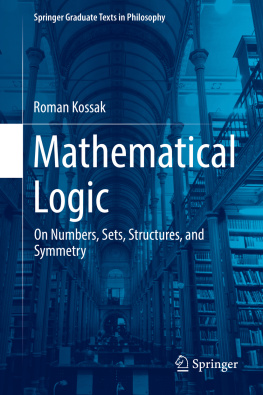

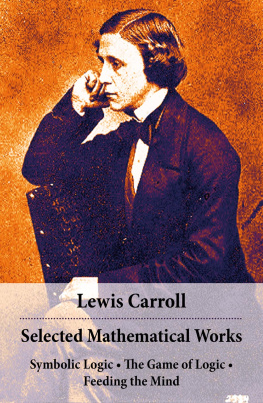
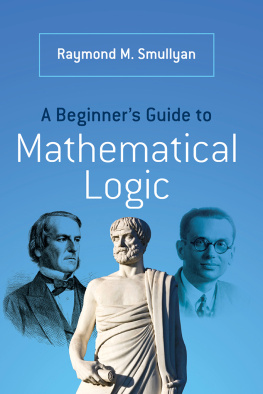
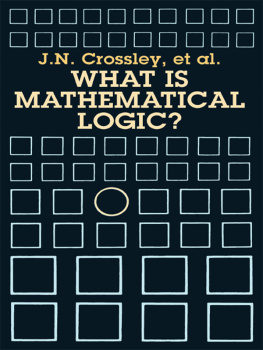
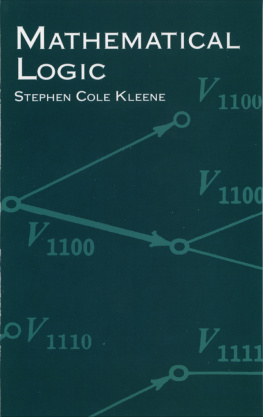


 The paper used in this publication meets the requirements of ANSI/NISO Z39.48-1992 (Permanence of Paper).
The paper used in this publication meets the requirements of ANSI/NISO Z39.48-1992 (Permanence of Paper).